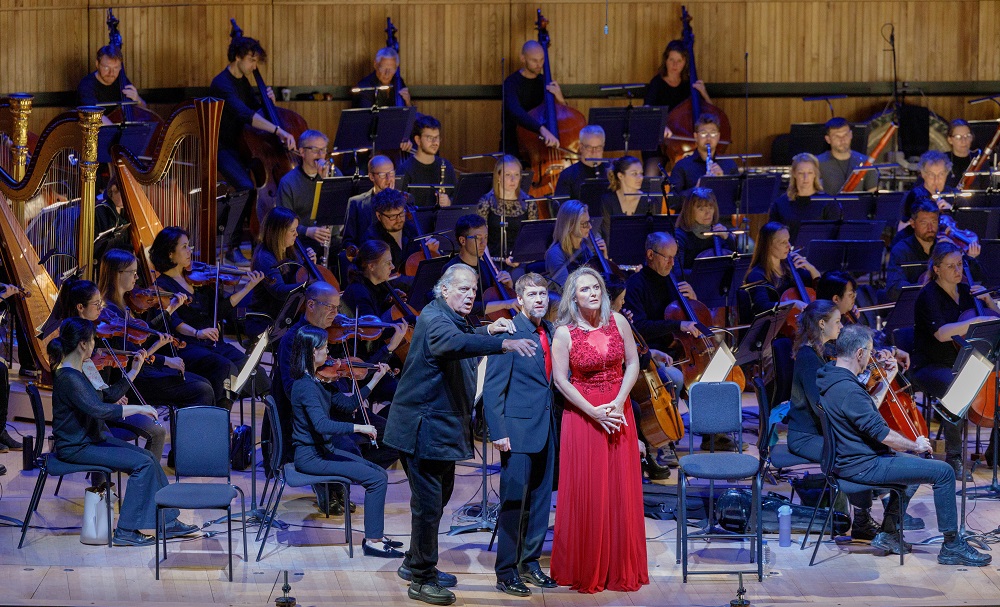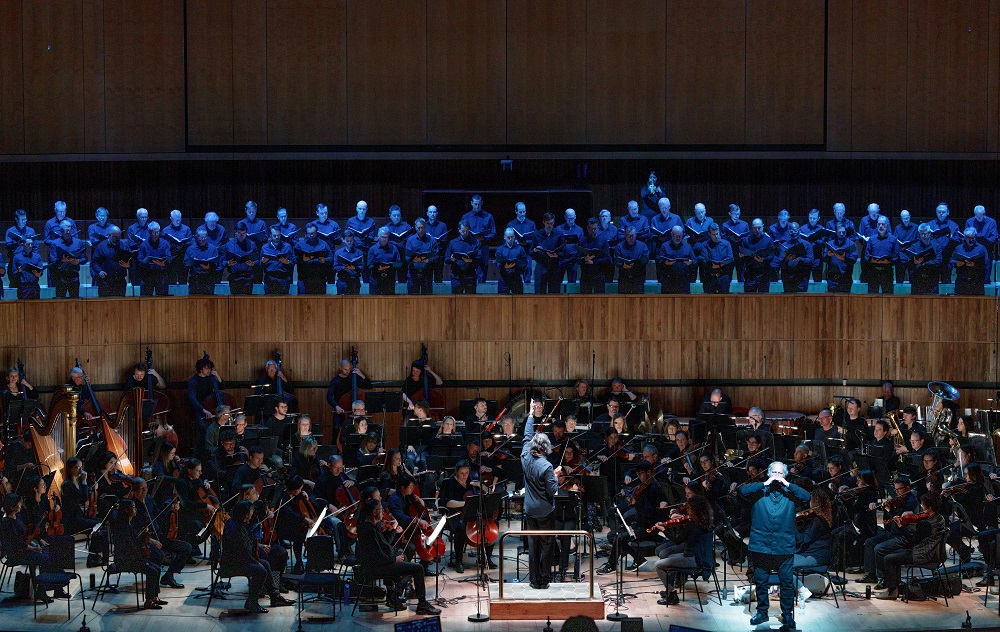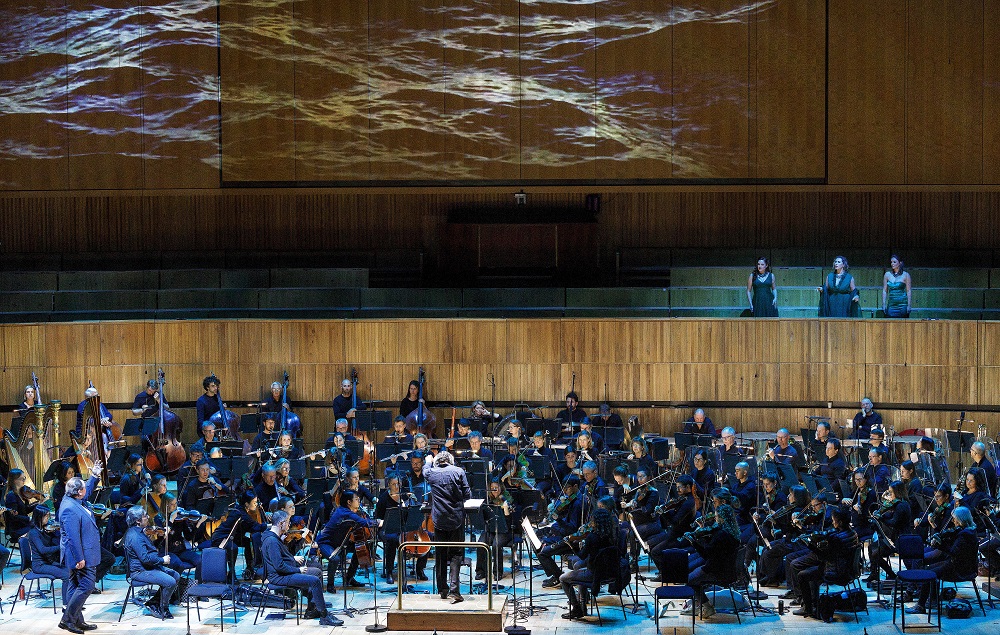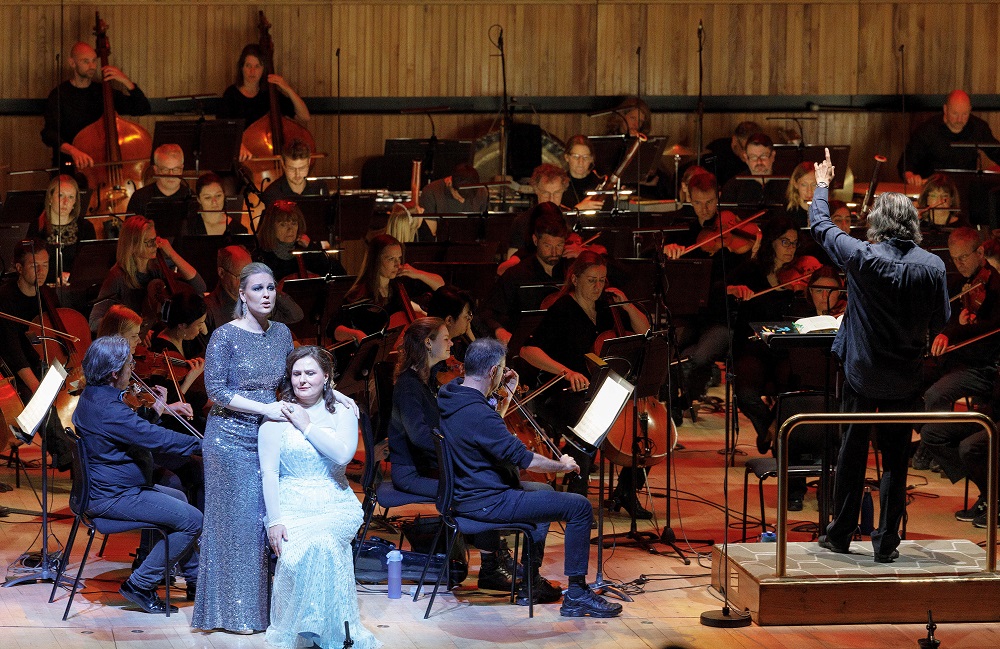Four years embracing pandemic, genocide and rapid environmental degradation predicted by Wagner’s grand myth have passed before the Southbank Brünnhilde could become a new woman – literally, in this Ring. Since Das Rheingold, the “preliminary evening”, in 2018, the London Philharmonic Orchestra under Vladimir Jurowski has grown ever more idiomatic and resplendent. Casting of the main roles, however, had more than its usual peaks and troughs this time round.
You suspect that there's a second league of singers when it comes to Wagner interpretation in the round who always give the same kind of performance whatever the circumstance: not enough when Götterdämmerung takes certain operatic and dramatic tropes, clichés even, and turns them into hair-raising modernist theatrical endgame. It was admirable that all singers other than the chorus did without scores, but given the different levels of engagement and the fact that PJ Harris's minimal "concert staging" was good for clear narrative lines, yet sometimes too bald for ignition, the kind of theatrical experience which leaves you trembling and exhausted wasn't going to happen.  We saw its possibilities with Sinéad Campbell Wallace (pictured above with Albert Dohmen and Günter Papendell). She came to this fresh from a giddying triumph as Richard Strauss's Salome for Irish National Opera, living every moment as the unformed Gutrune whom Siegfried is drugged into marrying with no memory of the woman he's left behind. The flames rose again with Estonian mezzo Kai Rüütel-Pajula's Waltraute, a rich and urgent characterisation of the Valkyrie sister who comes to Brünnhilde to tell her of father Wotan's abjection and the need to give up the ring.
We saw its possibilities with Sinéad Campbell Wallace (pictured above with Albert Dohmen and Günter Papendell). She came to this fresh from a giddying triumph as Richard Strauss's Salome for Irish National Opera, living every moment as the unformed Gutrune whom Siegfried is drugged into marrying with no memory of the woman he's left behind. The flames rose again with Estonian mezzo Kai Rüütel-Pajula's Waltraute, a rich and urgent characterisation of the Valkyrie sister who comes to Brünnhilde to tell her of father Wotan's abjection and the need to give up the ring.
We got the full, extended dramatic pelt in Dohmen's Hagen (pictured below with Jurowski, the LPO and male chorus), more a slightly bewildered, depressed hater of the fuller humans than a well of fathomless malignity. Dohmen's bass-baritone timbre might be better suited to the role of chief god, which he also sings - as does Robert Hayward, in the last opera a shadow of Nibelung father Alberich's former self following the trajectory we've been privileged to witness throughout this Ring. With Dohmen, the last degree of blackness in the voice isn't there (think John Tomlinson, terrifying in the summons of the vassals). But this was still a magnificently sung and subtly acted performance.. Günter Papendell as his weak half-brother projected the invertebrate character and even sounded vocally darker at times, but the spread at the top of the range was disconcerting. No qualms about the three Norns (Claudia Huckle, Claire Barnett-Jones and Evelina Dobračeva) or Rhinemaidens (Alina Adamski, Alexandra Lowe and Angharad Lyddon), though their position behind and above the orchestra - itself mostly on the flat, in a typically thoughtul Jurowski layout - made it occasionally difficult to hear them.
Günter Papendell as his weak half-brother projected the invertebrate character and even sounded vocally darker at times, but the spread at the top of the range was disconcerting. No qualms about the three Norns (Claudia Huckle, Claire Barnett-Jones and Evelina Dobračeva) or Rhinemaidens (Alina Adamski, Alexandra Lowe and Angharad Lyddon), though their position behind and above the orchestra - itself mostly on the flat, in a typically thoughtul Jurowski layout - made it occasionally difficult to hear them.
Ultimately, though, without a riveting Siegfried and Brünnhilde, respectively destroyed and nearly so in a web of malicious gameplaying, the whole experience is diminished..Burkhard Fritz's relaxed physical demeanour was exactly right for the fearless adventurer (pictured below in Act Three with the Rhinemaidens), and you had confidence that he'd last the course (even if Götterdämmerung isn't quite as killing for the tenor as Siegfried, it's still a massive challenge). But for the nonchalance to continue in the vortex of jealousy, hate and fury in Act Two contributed to the lowish temperatures of a stretch that should work you up to the point of wanting to smash something (my experience as a teenage student after watching the act in Chéreau's Bayreith Ring on the television; I went for a run arond Edinburgh's New Town instead). Too often I had the sensation of looking on and listening with fascination rather than being fully in that world; total engagement started up towards the end of Hagen's Watch, awesomely phrased by Dohmen, and the painful interlude which follows, and throughout Siegfried's encounter with the Rhinemaidens, totally perfect, (Fritz was back on form here), but a sense of distance crept back.  Svetlana Sozdateleva as bewildered, wronged, incandescent Brünnhilde here didn't quite turn the screw either in the way that Gwyneth Jones so searingly did for Chéreau, Anne Evans for Kupfer (and later Richard Jones).and Nina Stemme, who could even set things alight in concert. Sozdateleva's voice, five years on from when she sang the Walküre Brünnhilde for Jurowski, is gauzy in the mid register, warm kindling, gearing up to burst into flames which mostly happen, but not always. Her acting is a bit generalised, a notch below Campbell Wallace's, and though the Immolation Scene started with the right hieratic tragic-heroine stature, the final stretch defeated her. (Pictured below, Sozdateleva seated with Rüütel-Pajula).
Svetlana Sozdateleva as bewildered, wronged, incandescent Brünnhilde here didn't quite turn the screw either in the way that Gwyneth Jones so searingly did for Chéreau, Anne Evans for Kupfer (and later Richard Jones).and Nina Stemme, who could even set things alight in concert. Sozdateleva's voice, five years on from when she sang the Walküre Brünnhilde for Jurowski, is gauzy in the mid register, warm kindling, gearing up to burst into flames which mostly happen, but not always. Her acting is a bit generalised, a notch below Campbell Wallace's, and though the Immolation Scene started with the right hieratic tragic-heroine stature, the final stretch defeated her. (Pictured below, Sozdateleva seated with Rüütel-Pajula).
I doubt, on the other hand, if the Ring score has ever been more finely detailed, and never at the expense of the flow; Jurowski managed both to a supernatural degree. From the slight extra space given to the peak of the first wave in the Prelude - the Rhine theme which soon runs backward for the twilight - to the precision and space of the timpani doombeats following Hagen's stab in the back of Siegfried, attention could never waver. In addition to the wow factor from the on-platform brass, Wagner tubas included, the offstage horn calls and the blasts of the three steerhorns from centre, left and right for Hagen's summons were thrilling. We got six harps, too. The wall of male-chorus sound in Act Two had full impact thanks to the adding of the professional London Voices to the London Philharmonic Choir.  All climaxes had proper orchestral weight and colour. The Funeral March and end of the world were more impactful than I've ever heard them - though surely the selective stage directions projected on the back wall needed to tell us Valhalla was burning too. Fairly elaborate lighting design by Mark Jonathan included total blackouts before Acts One and Two, lights up to reveal Jurowski already on the podium. And Pierre Martin Oriol's video design was good when it happened, but if possible too infrequent - why not Rhine waves when Siegfried hits the river on his journey to the Gibichungs?
All climaxes had proper orchestral weight and colour. The Funeral March and end of the world were more impactful than I've ever heard them - though surely the selective stage directions projected on the back wall needed to tell us Valhalla was burning too. Fairly elaborate lighting design by Mark Jonathan included total blackouts before Acts One and Two, lights up to reveal Jurowski already on the podium. And Pierre Martin Oriol's video design was good when it happened, but if possible too infrequent - why not Rhine waves when Siegfried hits the river on his journey to the Gibichungs?
Never mind; the orchestral depiction sang it all: a worthy tribute to Andrew Davis, who died last week - theartsdesk will be running tributes from Jurowski and others this coming week - and who conducted the LPO in so many performances at Glyndebourne before Jurowski took over the main role there. Sir Andrew, scheduled to conduct an LPO concert in November, woud have been delighted with how the orchestra sounded last night.














Add comment